Estimated reading time: 6 minutes
Unlike humans, chickens can't tell you that they’re feeling off. Instead, we have to learn to identify when our chickens act strangely. These behaviors can indicate that something is wrong with our chickens.
Taking care of chickens on your homestead is a reasonably easy task, but just like any other animal, chickens can fall ill sometimes. Sick chickens on your homestead can quickly become targets for predators and bullying by the other members of the flock.
Want to save this post for later? Click Here to Pin It On Pinterest!
No one ever said chickens are friendly! They’re happy to bully the sick members of the flock, leading to even more problems.
The signs and symptoms of common chicken illnesses can be hard to recognize at times. The easiest way to identify that something is wrong with your flock is by watching their behavior, so here are some signs that your chickens are acting strange.
7 Strange Chicken Behaviors That Are Signs of Illnesses
1. Your Chickens Aren’t Eating
One of the most prominent alarm signals is when your chicken loses its appetite. Start a habit now of watching your chickens during feeding time. Chickens that are disinterested in eating typically have something wrong.
If it's warm outside, make sure that your chicken isn't in heat stress. Add some additional sources of water. If that's not the issue, you need to inspect your chicken thoroughly. Separate her from the rest of the flock and try encouraging her to drink with a dropper.
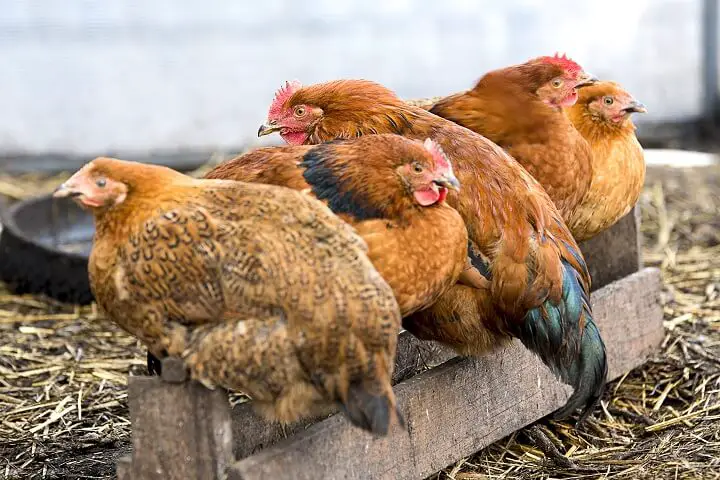
2. Your Chickens Are Sneezing or Coughing
Chickens make tons of noises. If you spend any time with your chickens, then you know they sure love to talk a lot. You’ll start to recognize certain sounds that they make repeatedly.
Alarming sounds are respiratory sounds. If your chicken starts to sneeze, cough, breathe heavily, or produce raspy sounds, they need to be evaluated quickly. You need to isolate the bird to reduce spreading the illness throughout the flock.
3. Your Chicken is Limping
Any time that you spot a chicken limping is a sign that there is a problem. Certain conditions can affect their legs and feet, and they can happen at any time without warning.
Check his legs first to look for any cuts or bleeding. If you find an injury, treat it with antiseptic powder or ointment. If you don't see any injury to the leg, look at the sole of the foot. Your chicken might have an infection caused by Staphylococcus bacteria. This bacteria enters a wound, no matter how small it is, causing the pad to become swollen, infected, and painful.
This condition is known as bumblefoot. You might find that pus comes out of the foot if you squeeze it. A vet can prescribe a course of antibiotics. Tylan is an antibiotic that can be put into their drinking water.
4. Your Chicken is Pecking at Feathers
Chickens love to peck, but pecking at feathers is a common problem behavior for flocks. At times, it can become obsessive. Chickens can obsessively pick at their feathers or another chicken’s feathers. Either way, it’s often a sign that your bird is bored or overcrowded.
You have to make sure that you provide enough space for your flock. If you do have enough space for your birds, and the behavior is taking place, the pecking might be due to a specific bird with the obsessive behavior. In that case, the chicken might need to be culled to spare the health of the flock. Breaking an obsession in a chicken can be impossible at times.
5. Your Chicken is Standing By Itself
Chickens like to mask their illnesses, but observing their behavior with their flock can show you signs of issues. Look for birds that wander away or keep their distance from the rest of the group. Another sign of a problem is a bird that stays in the coop must longer in the morning than the rest of the group. A bird that doesn't go up to roost at night is also problematic.
All of these are strange chicken behaviors that can pinpoint that there is an issue. Make sure to check your chickens out thoroughly. Look at their eyes, nose, beak, mouth, and the rest of their body. Something is wrong; you just don't know what that is yet.
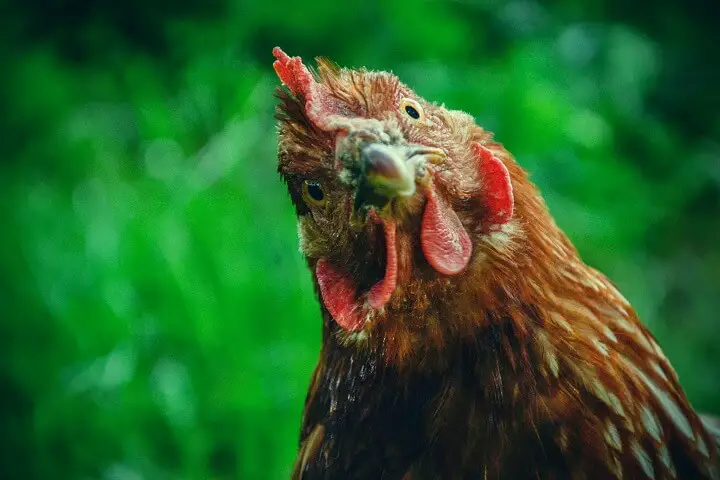
6. Your Chicken is Panting
Unfortunately, chickens can't sweat when they're too hot, so they have to try another method: panting. This behavior is just like a dog who is too hot or spent too much time running around the yard.
If you find your chicken panting, it's time to get her into some shade and give her some freshwater as well. When it starts to get hot outside, chicken owners need to check on their birds frequently. Keep cold treats and icy water nearby.
One simple trick is to put frozen or canned vegetables in muffin cups with water. Then, freeze them to make some cold treats for the summer that are nutritious as well.
7. Your Chicken is Hunched Up
If one of your girls is hunched up, then it means something is wrong. This behavior indicates that she is either in pain or sick. A hunched up hen will move very slowly or not at all, so they easy to spot in a flock of mobile chickens.
The first thing you should do is pick up your hen to check for any injuries. If you find an injury, she needs to be removed from the flock and treated. Check her vent to make sure she isn’t egg-bound or injured. An egg that is stuck can kill a bird quickly.
If you don’t find an injury or a vent issue, remove your hen for a few days and monitor her behavior.
Watch Your Chickens Closely
Since our chickens cannot hold up a sign telling us they have a problem, the only thing we can do, as responsible chicken owners, is watching our flock. When you take them food and water in the morning, observe them. Any strange chicken behavior can indicate that a problem is arising.
Catching problems before they become too intense is the best way to get your chickens healthy again. When caught fast enough, most chicken illnesses are easy to fix.
Like this post? Don't Forget to Pin It On Pinterest!


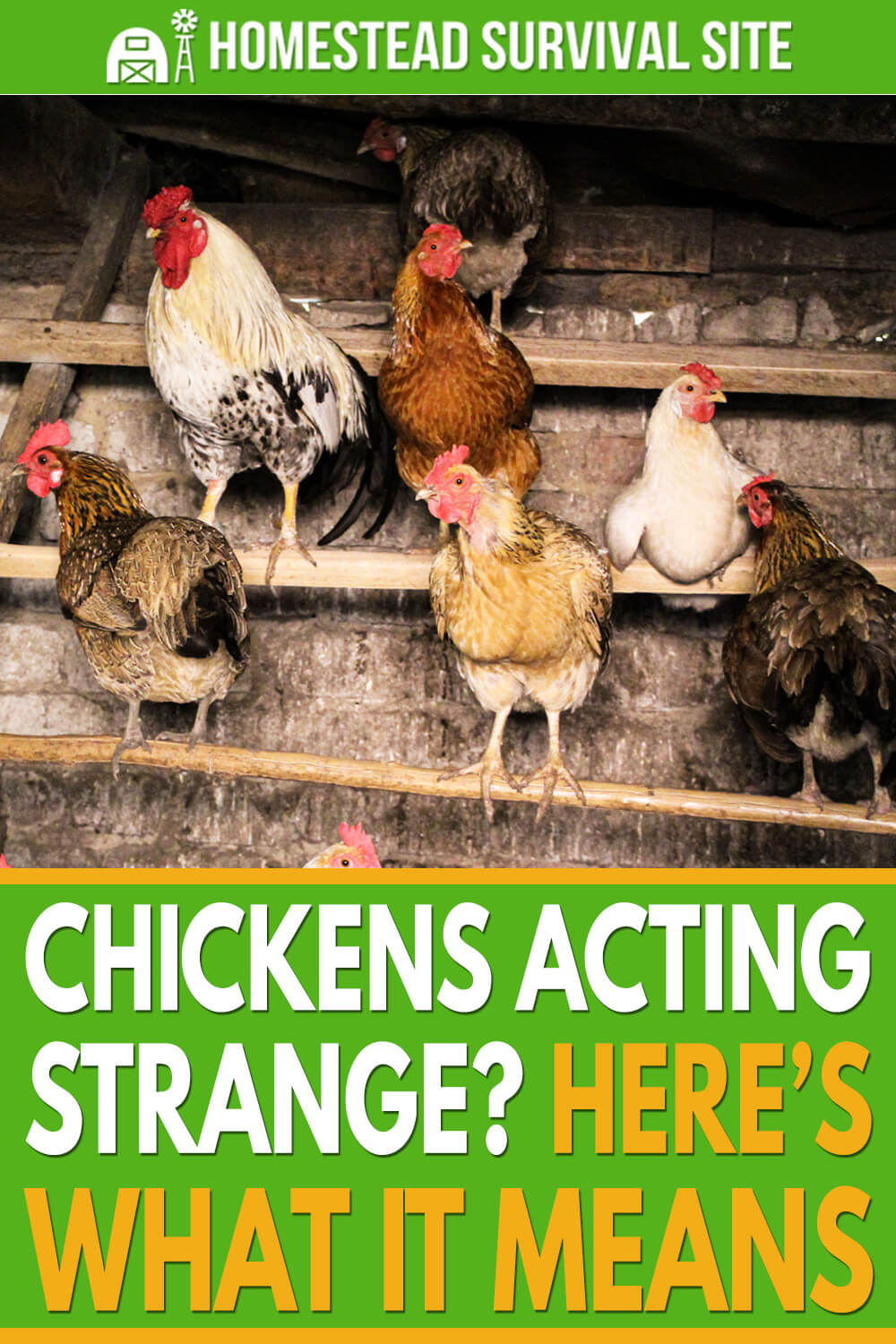

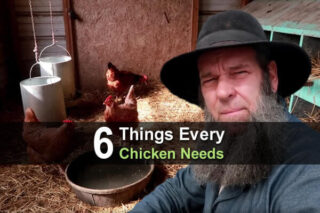

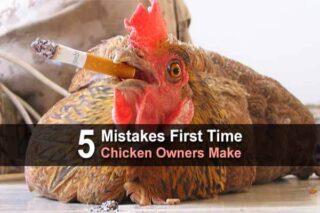

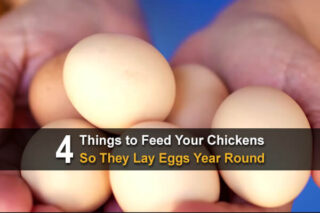

Also check poop for signs of worms..round worms or tapes most common, easily treated. Most things mentioned here are easily treated at home, don’t need to keep running to the vet
We have a meat chicken that started doing a weird head wagging thing. Then when we put her in with the rest of them, one of the roosters started doing it too. Has anyone else seen this and should I be concerned?
I had a roster die yesterday didn’t see anything wrong with it and today I found a Henry dead didn’t see anything wrong with it they are not a Year old yet what is happening